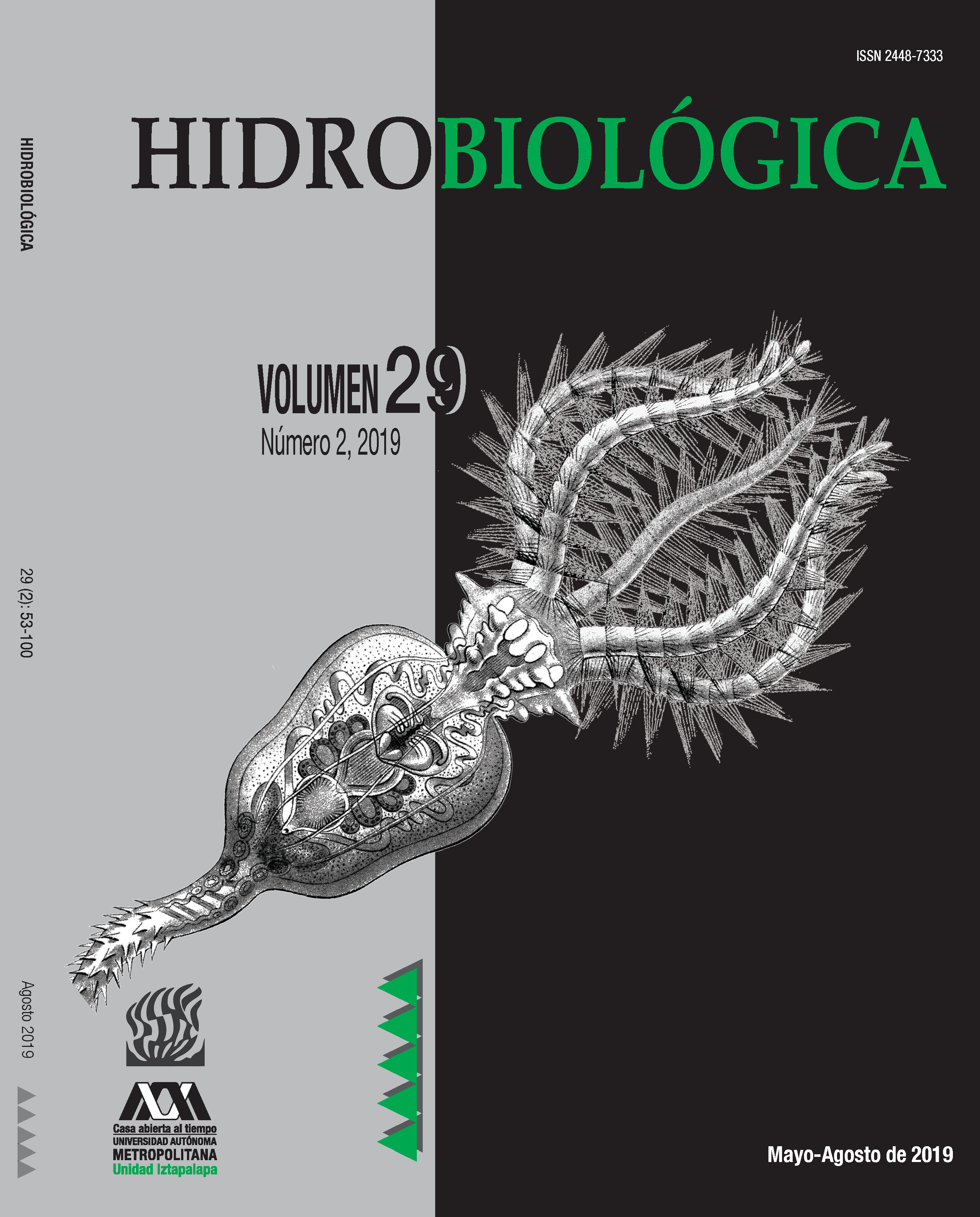Effects of diclofenac on the freshwater rotifer Lecane papuana (Murray, 1913) (Monogononta: Lecanidae)
DOI:
https://doi.org/10.24275/uam/izt/dcbs/hidro/2019v29n2/TovarKeywords:
chronic toxicity, emergent contaminants, fecundity inhibition, non-steroideal anti-inflammatory drug, zooplanktonAbstract
Background: The diclofenac (DCF) is a non-steroidal anti-inflammatory drug (NSAID) that has been found in groundwater and superficial water, as a result of its high consumption in animal and human health. Moreover, DCF toxicity has been studied in different fresh-water animal models and it has been shown to have harmful effects on cladocerans, fish and amphibians, but the available information is still scarce in terms of induced alterations in organisms that are the basis of trophic levels such as rotifers. Goals: The present work assessed the effect of DCF on acute and chronic responses of the freshwater rotifer Lecane papuana (Murray, 1913). Methods: Acute toxicity tests were carried out to determine the LC50 of DCF (128.82 mg/L). Then, five sublethal concentrations were selected (1/160, 1/80, 1/40 y 1/20, y 1/10 of the corresponding LC50), and a control group (reconstituted hard water), to which amictic eggs were exposed to determine the effect on hatching and neonates were exposed to evaluate the effects on further fecundity and population increase in terms of r. Results: DCF diminished the r rate through the inhibition of eggs hatching and reduced fecundity of exposed females (fewer eggs per female) at 0.80 mg/L and higher concentrations. The effective median concentrations were about 700-fold lower than the corresponding LC50. Conclusions: These results indicate that DCF can affect rotifer populations at concentrations, that despite being higher than environmental concentrations, and due to the continuous release of DCF to the aquatic systems, would eventually have a negative impact on the exposed populations.
Downloads
Downloads
Published
How to Cite
Issue
Section
License
Los autores/as que publiquen en esta revista aceptan las siguientes condiciones:
De acuerdo con la legislación de derechos de autor, HIDROBIOLÓGICA reconoce y respeta el derecho moral de los autores, así como la titularidad del derecho patrimonial, el cual será cedido a la revista para su difusión en acceso abierto.
Publicar en la revista HIDROBIOLÓGICA tiene un costo de recuperación de $500 pesos mexicanos por página en blanco y negro (aproximadamente 29 dólares americanos) y $1000 pesos por página a color (aproximadamente 58 dólares americanos).
Todos los textos publicados por HIDROBIOLÓGICA sin excepción se distribuyen amparados bajo la licencia Creative Commons 4.0Atribución-No Comercial (CC BY-NC 4.0 Internacional), que permite a terceros utilizar lo publicado siempre que mencionen la autoría del trabajo y a la primera publicación en esta revista.
Los autores/as pueden realizar otros acuerdos contractuales independientes y adicionales para la distribución no exclusiva de la versión del artículo publicado en HIDROBIOLÓGICA (por ejemplo incluirlo en un repositorio institucional o publicarlo en un libro) siempre que indiquen claramente que el trabajo se publicó por primera vez en HIDROBIOLÓGICA.
Para todo lo anterior, el o los autor(es) deben remitir el formato de Carta-Cesión de la Propiedad de los Derechos de la primera publicación debidamente requisitado y firmado por el autor(es). Este formato se puede enviar por correo electrónico en archivo pdf al correo: enlacerebvistahidrobiológica@gmail.com; rehb@xanum.uam.mx (Carta-Cesión de Propiedad de Derechos de Autor).
Esta obra está bajo una licencia de Creative Commons Reconocimiento-No Comercial 4.0 Internacional.


